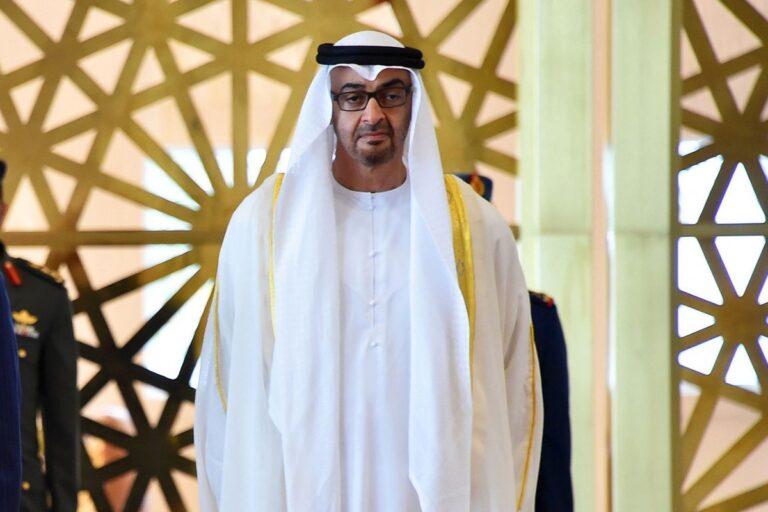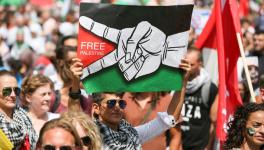Israel, UAE Finally Consummate Their Relationship

The UAE Crown Prince Sheikh Mohammed Bin Zayed: Palestinian leadership has accused UAE of ‘stabbing them in the back’ by establishing diplomatic relations with Israel.
Success has many fathers, but failure is an orphan. The controversial peace deal between Israel and the United Arab Emirates has two fathers already — US President Donald Trump and Israeli Prime Minister Benjamin Netanyahu. Trump’s son-in-law and adviser on the Middle East Jared Kushner slyly claims to be a third father.
Trump and Netanyahu have openly claimed fatherhood — Netanyahu even ahead of Trump. Their eagerness is understandable: both are in election cycles, so to speak, and neither misses a rare opportunity to make political mileage out of a success story.
Unsurprisingly, the UAE Crown Prince Sheikh Mohammed Bin Zayed is fighting shy of admitting his indispensable role in conceiving the UAE-Israel deal. With an eye on the Arab street, the sheikh keeps a low profile, although the roaring affair between Israelis and Emiratis is nearly a quarter century old and has been an open secret in the bazar.
The perfect harmony between Trump, Netanyahu and Sheikh Mohammed is not to be doubted in sharing this intercourse that has finally consummated. They spoke with each other Thursday before announcing their success in a joint statement.
Yet, when the progeny actually appeared in flesh and blood, it has caused sensation. The leitmotif is that Israel has broken the glass ceiling and is holding Arab hands. It signifies a dramatic realignment in Middle Eastern politics. Once again, Palestinians, who are not mentioned in this US-Israeli-Emirati document, are treated as political pawns and excluded from decision-making about their own future.
The US-Israel-UAE joint statement claims that the full normalisation of relations between Tel Aviv and Abu Dhabi “will unlock the great potential in the region.” The statement says that in the coming weeks, Israel and the UAE will flesh out agreements relating to diverse fields such as investment, tourism, direct flights, security, telecommunications, technology, energy, healthcare, culture, the environment, the establishment of reciprocal embassies, and “other areas of mutual benefit”.
A tangible outcome is that Israel will “suspend” its annexation plans in the West Bank. This is apparently a sop to Abu Dhabi to claim continued commitment to the Palestine problem. But it wont fly. The Palestinian officials estimate that the Sheikhs in Abu Dhabi have betrayed them and Israel’s annexation plans will reappear on Netanyahu’s agenda after a pause.
Another sop given to the Emiratis by the Israeli side is that “all Muslims who come in peace may visit and pray at the Al Aqsa Mosque, and Jerusalem’s other holy sites should remain open for peaceful worshipers of all faiths.”
Curiously, the joint statement anticipates that “additional diplomatic breakthroughs with other nations are possible.” Kushner has hinted that other GCC states may follow the Emirati footfalls. To be sure, Sheikh Mohammed would have coordinated his move with Saudi Crown Prince Mohammed bin Salman. The bets are that Bahrain and Oman are the next in the queue to normalise ties with Israel.
In geopolitical terms, the joint statement announces that the US, Israel and the UAE will together launch a Strategic Agenda for the Middle East to expand diplomatic, trade, and security cooperation based on the three countries’ “similar outlook regarding the threats and opportunities in the region, as well as a shared commitment to promoting stability through diplomatic engagement, increased economic integration, and closer security coordination.”
How this pans out will bear watch. But, interestingly, the joint statement avoids any reference to Iran directly or indirectly. The UAE does not want to derail its nascent diplomatic initiatives to improve relations with Iran. Arguably, for Emiratis today, it is the Turkey-Qatar axis that is more worrisome than Iran’s rise, given those two countries’ mentorship of the Muslim Brotherhood.
The optics of the Israeli-Emirati deal will be that the Arabs have “betrayed” the Palestinian cause. Israel, for sure, comes out as a big winner by taking a giant leap forward in realising its long-term strategy to integrate with like-minded Arab regimes.
Quintessentially, both Israel and the UAE are preparing for a transitional period ahead where by pooling their resources, they can safeguard their interests optimally. There is great angst in the minds of the GCC rulers over the consistency of the US’ regional strategy in the Middle East, which is exacerbated by the uncertainties regarding the outcome of the November election in America.
A Biden presidency would mean not only the sudden death of Trump’s “maximum pressure” approach towards Iran but a resumption of US-Iranian engagement, much to the discomfiture of the Sunni oligarchies of the Persian Gulf and Israel.
An even more disconcerting scenario may present itself if a Democratic Administration indeed proceeds to withdraw the US from the war in Yemen, as promised, or promotes human rights and democracy in the region. The Democratic platform in the Muslim Middle East may hark back to the Barack Obama era.
Fundamentally, the US’ historical role as provider of security is changing. This is where the Turkey-Qatar axis becomes an existential threat for the UAE. We may expect a Israel-UAE convergence to counter Turkey’s Islamist policies and “neo-Ottomanism”. Libya is a theatre of conflict between Turkey and the UAE.
In the Turkish perspective, both Israel and UAE are adversaries who support Kurds. Any meaningful improvement in Turkish-Israeli relations can be ruled out so long as President Recep Erdogan promotes Hamas. Meanwhile, Erdogan believes that the UAE was a staging ground for the failed 15 July 2016 coup d’état to kill him and overthrow his government.
In his first remarks earlier today, Erdogan has said he’s considering suspension or downgrading of Turkey’s diplomatic ties with the UAE. “I gave an order to the foreign minister. I said we could suspend diplomatic relations with the Abu Dhabi administration or withdraw our ambassador,” Erdogan said.
Suffice to say, Turkey and Qatar will view the Israel-UAE strategic tie-up as a security challenge. For Turkey, Qatar and Iran, this comes as a gift from the heavens giving them the opportunity to take the centre stage as champions of the Palestinian resistance. A strongly-worded statement by the Turkish Foreign Ministry said, “History and the conscience of the region’s peoples will not forget and never forgive this hypocritical behaviour of the UAE, betraying the Palestinian cause for the sake of its narrow interests.”
The statement added, “It is extremely worrying that the UAE should, with a unilateral action, try and do away with the (2002) Arab Peace Plan developed by the Arab League. It is not in the slightest credible that this three-way declaration should be presented as supporting the Palestinian cause.”
The Iranian Foreign Ministry has called the UAE move a “strategic folly”. The statement in Tehran said “the dagger which stabbed both the Palestinian nation and the Muslim peoples in the back will backfire and further strengthen the Resistance Axis by enhancing unity and solidarity against the Zionist regime and reactionary governments in the region.”
On balance, how far Israel can replace the US as a provider of security for the authoritarian Arab regimes of the Persian Gulf remains to be seen. The petrodollar states are used to outsourcing their national security. And Israel’s capacity to provide intelligence and its expertise in stifling dissent would have great relevance to the sheikhs’ fiefdoms.
For Israel, the GCC states can be an engaging market. There is vast scope for expansion in trade and economic relations. Israel’s high-tech industry can seize opportunities in investments, project exports and even arms sales. But how the Arab public opinion would regard the looming Israeli presence remains an open question.
It is too much to expect Israel to mend its violent methods to bend and break the Palestinian people, build illegal settlements, maintain an apartheid regime and attack human rights defenders. Interestingly, several left-wing and liberal US Jewish organisations have rejected the Israel-UAE deal to normalise relations, saying it is “nothing to celebrate”.
They have dismissed this deal as Trump and Netanyahu’s latest ploy — aided and abetted by the UAE — and as nothing more than theatrics and mere distraction from the “pandemic, economic crisis, civil unrest, and plummeting support from the public in the US and Israel”.
Indeed, there is some merit in such criticism. The point is, both Trump and Netanyahu are in deep political trouble — each his own way — and are desperately keen to flaunt success stories. But, the intriguing part is what Sheikh Mohammed gets out of all this in political terms in Muslim Middle East.
Get the latest reports & analysis with people's perspective on Protests, movements & deep analytical videos, discussions of the current affairs in your Telegram app. Subscribe to NewsClick's Telegram channel & get Real-Time updates on stories, as they get published on our website.
























